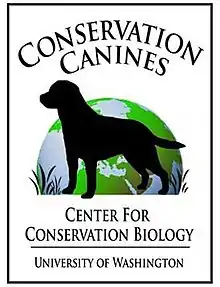Conservation Canines
Conservation Canines (CK9) is a non-profit organization that trains detection dogs and their handlers for the purposes of wildlife research. It is part of the Center for Conservation Biology at the University of Washington. Since 1997, led by Dr. Samuel Wasser, Conservation Canines has worked internationally with species including the Pacific Pocket Mouse,[1] the Jemez Mountains salamander,[2] Killer whales,[3] and Tigers.[4]
 | |
| Type | Non-profit |
|---|---|
Parent organization | University of Washington |
| Website | conservationbiology |
The training facility is located in Eatonville, WA. Current and former client partners include The Nature Conservancy, U.S. Fish and Wildlife Service, U.S. Forest Service, as well as various Universities and state and local agencies.
CK9 helped Western Ecological Research Center researchers survey conserved grasslands in San Diego County and found that indeed badgers are active.[5]
Conservation Canines sources their dogs from shelters and rescue organizations. Dogs are trained using a ball or toy reward system.[6]
References
- San Diego Natural History Museum (January 30, 2013). "Focused Surveys for the Pacific Pocket Mouse in Orange County, California" (PDF) – via California Department of Fish and Wildlife.
- "Conservation Canines in New Mexico". The Nature Conservancy.
- Jarvis, Brooke (October 10, 2013). "Fecal finders: how poop-sniffing dogs are helping killer whales". The Verge.
- "Special Dogs Assist in Wild Tiger Conservation Efforts in Cambodia | Voice of America - English". voanews.com. February 21, 2010.
- "American Badgers in San Diego County" – via www.usgs.gov.
- "FAQs about Conservation Canines". CK9.